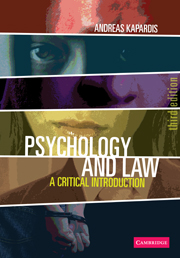Book contents
- Frontmatter
- Contents
- List of case studies
- Acknowledgements
- Foreword
- 1 Psycholegal Research: An Introduction
- 2 Eyewitnesses: Key Issues and Event Characteristics
- 3 Eyewitnesses: The Perpetrator and Interviewing
- 4 Children as Witnesses
- 5 The Jury
- 6 Sentencing as a Human Process, Victims, and Restorative Justice
- 7 The Psychologists as Expert Witnesses
- 8 Detecting Deception
- 9 Witness Recognition Procedures
- 10 Psychology and the Police
- 11 Conclusions
- Notes
- References
- Index
7 - The Psychologists as Expert Witnesses
- Frontmatter
- Contents
- List of case studies
- Acknowledgements
- Foreword
- 1 Psycholegal Research: An Introduction
- 2 Eyewitnesses: Key Issues and Event Characteristics
- 3 Eyewitnesses: The Perpetrator and Interviewing
- 4 Children as Witnesses
- 5 The Jury
- 6 Sentencing as a Human Process, Victims, and Restorative Justice
- 7 The Psychologists as Expert Witnesses
- 8 Detecting Deception
- 9 Witness Recognition Procedures
- 10 Psychology and the Police
- 11 Conclusions
- Notes
- References
- Index
Summary
Any development in scientific thinking and techniques shall not be kept from the court. Moreover, such developments in scientific thinking should not be kept from the court because they remain at the stage of hypothesis.
Lord Justice Cage and Justices Cresswell and Field in R. v. Bowman, Court of Appeal (Criminal Division), 2006, EWCA Crim. 417.Expert witnesses do not just appear out of the blue. They are recommended by a city's ‘old boy’ network over lunches, telephone calls and drinks. Or they are tried out by legal firms and insurance companies and, if successful, put on to their ‘panels’ of suitable experts.
(Ragg, 1995)Greater numbers of expert witnesses are being permitted to testify on a broader base of subject matter than has hitherto been permitted.
(Freckelton and Selby, 2002:12).INTRODUCTION
The earliest description of the role of expert evidence in common law courts is to be found in the case of Buckley v. Rice Thomas. in 1554 (Freckelton and Selby, 2005:21). Experts, in the form of medical doctors, appear to have first been called upon to advise judges at the Old Bailey 600 years ago, but it was not until around 1620 that a jury was furnished with expert testimony for the first time. By 1721 there was the first challenge to an expert witness (a surgeon) testifying for the prosecution by another expert testifying on behalf of the defendant (Landsman, 1995).
- Type
- Chapter
- Information
- Psychology and LawA Critical Introduction, pp. 229 - 256Publisher: Cambridge University PressPrint publication year: 2009

